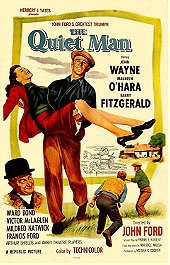Nostalgia abounds John Ford's glitteringly perfect adaptation of a Maurice Walsh story he acquired the rights for in 1946. "The Quiet Man" is Ford's broadly comic, inherently charming foray into blarney that never once mocks or feels bogus, even if the setting of Inisfree was entirely fictional. In fact, Ford persisted with the studio, even accepting a meagre budget, if they allowed him to shoot in Ireland, much of which is capitalised on during the climactic punch-up between John Wayne and Victor McLaglen. Inisfree's scenic backgrounds are stunningly realised by Technicolor photography courtesy of Winton Hoch, whose vivid compositions capture the panoramic beauty of the Irish countryside, earning him a much-deserved Oscar. Mixing genre forms such as action, comedy and romance was not new ground for John Ford, but his leading lady Maureen O’Hara, whose steely-eyed sensual magnetism as the feisty, high-spirited Mary Kate Danaher contrasts with her usually timid female ciphers, enabled him to surmount the melodrama and sentimentality his non-Westerns were predisposed to. John Wayne and Maureen O'Hara's incredible chemistry skyrockets the romantic leanings of the film, entering their rain-soaked kissing scene into the annals of cinema history.
John Ford's no-frame-wasted approach undoubtedly secured his position as one of cinema's most respected directors, and his post-war output remains popular with audiences, particularly "The Quiet Man" and "The Searchers". Admired by audiences and critics alike, "The Quiet Man" is so accessible it is now considered Sunday afternoon fare when in fact it is so much more than that. Unequivocally endearing though it is, the lush cinematography and prevailing exuberance augment the amusing romanticism and ribald rhapsody; the softening of Ford's unsophisticated features has broadened their enthral for older generations. Why is it so objectionable for a well-crafted, congenial slice of pure entertainment loaded with universal back-slapping humour and unbridled appeal to be considered a masterpiece? Quite simply, because Ford's aim was not to create a masterpiece. "The Quiet Man" is neither maudlin or pompous, psychologically or morally complex - it is sublimely simplistic, lacking the lyricism of his deeper westerns, and is more enjoyable as a result. Ford's biggest cinematic departure saw him utilise a fine cast, authentic dialogue and breathtaking backdrop to present Irish life as it was in the 1920s, albeit from the fish-out-of-water perspective of an American boxer seeking to reconnect with his roots only to fall in love with a bullying landowner's fiery sister. A joy to behold on every level, films as beautifully shot and executed as this on location in Ireland are non-existent. Moreover, there are no films concerning Irish society devoid of religious and political animosity. "The Quiet Man" depicts a crowd-pleasing and anachronistic, idealistic version of Ireland ruled by anachronistic customs, community standing, respectability, dowries and drunken donnybrooks. According to O'Hara, John Ford longed to be an Irish rebel - this effusive, disarming film adds credence to that statement.
 Login
Login